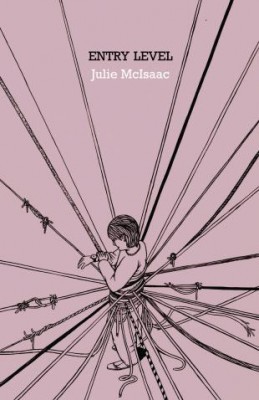Humdrum and toil. That’s the context for Julie McIsaac’s first collection of short stories, Entry Level. Whether they’re working in a Dilbert-like telesales office or a giant toy store, our dejected protagonists try to navigate tedious jobs and the start of uncertain futures.

Entry Level
Julie McIsaac
Insomniac Press
$19.95
paper
162pp
978-1-55483-068-8
The office environment in “Team Players” pits employees against management, the sarcastic against the cheery, us against them. It’s a familiar hierarchy where disdain trickles up from the sales team to management, and demoralizing regulations pour back down from the higher ups.
After some consideration, it has been decided that while drawing in between phone calls is unacceptable, doodling will be permitted.
Thank you, Management
(And yes, someone is in charge of distinguishing between the two.) The more interesting notion of “the costs of being female” (as stated on the back cover) starts to emerge from the humdrum and toil. Pregnancy, menstruation, breasts – all of these have consequences. Pregnant women experience reduced mobility not only physically, but also professionally. In “Team Players,” a pregnant Tanya explains to her co-worker how much she needs her current job in the face of the company’s cutbacks. “I couldn’t keep the job had when I got pregnant, and no one wants to hire you once you’re showing. They know you’ll be gone soon, I guess, or they don’t want to get saddled with your maternity pay and shit.”
Puberty opens up the possibility of bearing children, adds a monthly cycle to one’s lifestyle, and alters the physique in ways one might not be ready for. A reluctantly pubescent Jessica in “Hidden in Plain Sight” tries to stave off the attention her new body is attracting, especially from her leering neighbour. “You despise attention, especially from boys. You attempt invisibility by wearing baggy sweatshirts and Doc Martens. Your look is boyish, though you are not a tomboy, just desperate not to be a girl, not now.”
McIsaac compounds the anxiety that her young female leads experience as a result of biology by isolating them in some fashion, usually by eliminating the father from the picture. Facing motherhood alone and being unable
to escape the situation – to escape one’s body – leads to a sense of detached helplessness in these stories. It’s hard to connect with some of the women, like Kathleen and Tanya, since they seem so resigned to their situations. Jessica, on the other hand, is the only one who tries to fight, though her story may not have the ending we would all strive for. In Entry Level’s world there is no real hope in the end, no solution for these women. Biology comes at a price, and just as people suffer the monotony of crappy jobs to pay the rent, women will suffer their bodies and pay the toll for being women. mRb






0 Comments